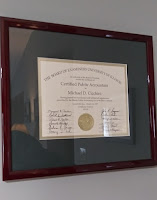In my earlier life, becoming a CPA was, in a sense,
easy. To be sure, the two-day exam
itself was very tough. Unlike state bar
exams which sometimes have an
80% first-time pass rate, the November 1996 CPA
exam, for example, had a
17% pass rate for first-time test takers. But the
process of becoming a CPA was very
simple. Just get a B.S. or B.B.A. in
accounting, sign up for and pass the CPA exam, and then wait for your
certificate to arrive in the U.S. mail.
Granted, it wasn’t that way in every state, but that’s the way it was in
my neighboring state of
Illinois where I got my CPA certificate.
The certification allowed you to use “CPA” after your name, and, as the
accompanying letter from the Illinois Board of Examiners informed me: “The
certificate is good for life and does not need to be renewed.” Congratulations and welcome to the
profession!
Today, there are many articles about the declining number of
CPAs and, especially, of accounting majors in the CPA pipeline. The latest such article is here, in today’s
WSJ (subscription required). That
article’s title indicates its proposed solution to the problem: How can we make accounting cool? And there are many articles like this one,
angsting about how to replenish the numbers within the profession. But I doubt people are now avoiding accounting
because it’s un-cool. It has always
been un-cool (which, in some circles, can be cool).

